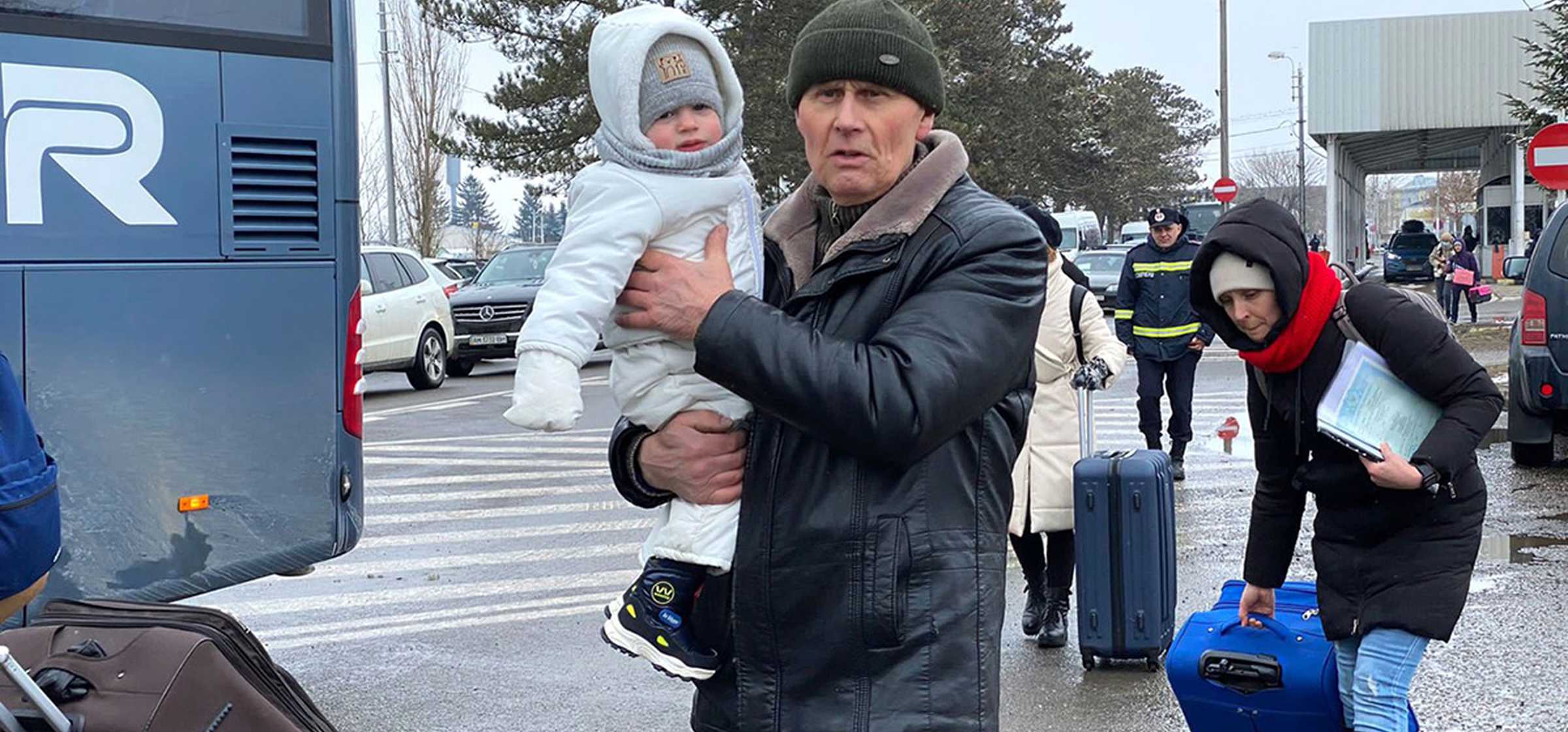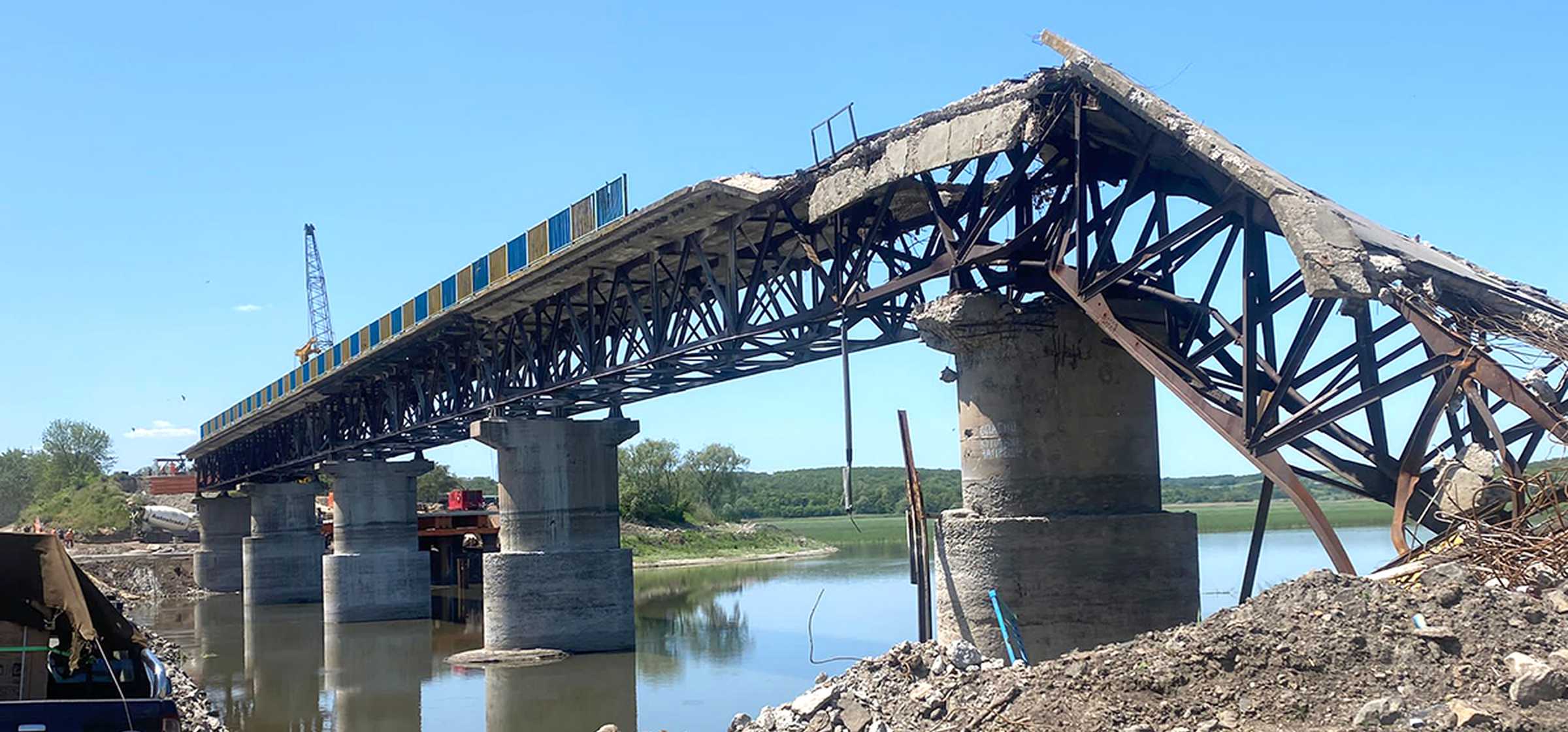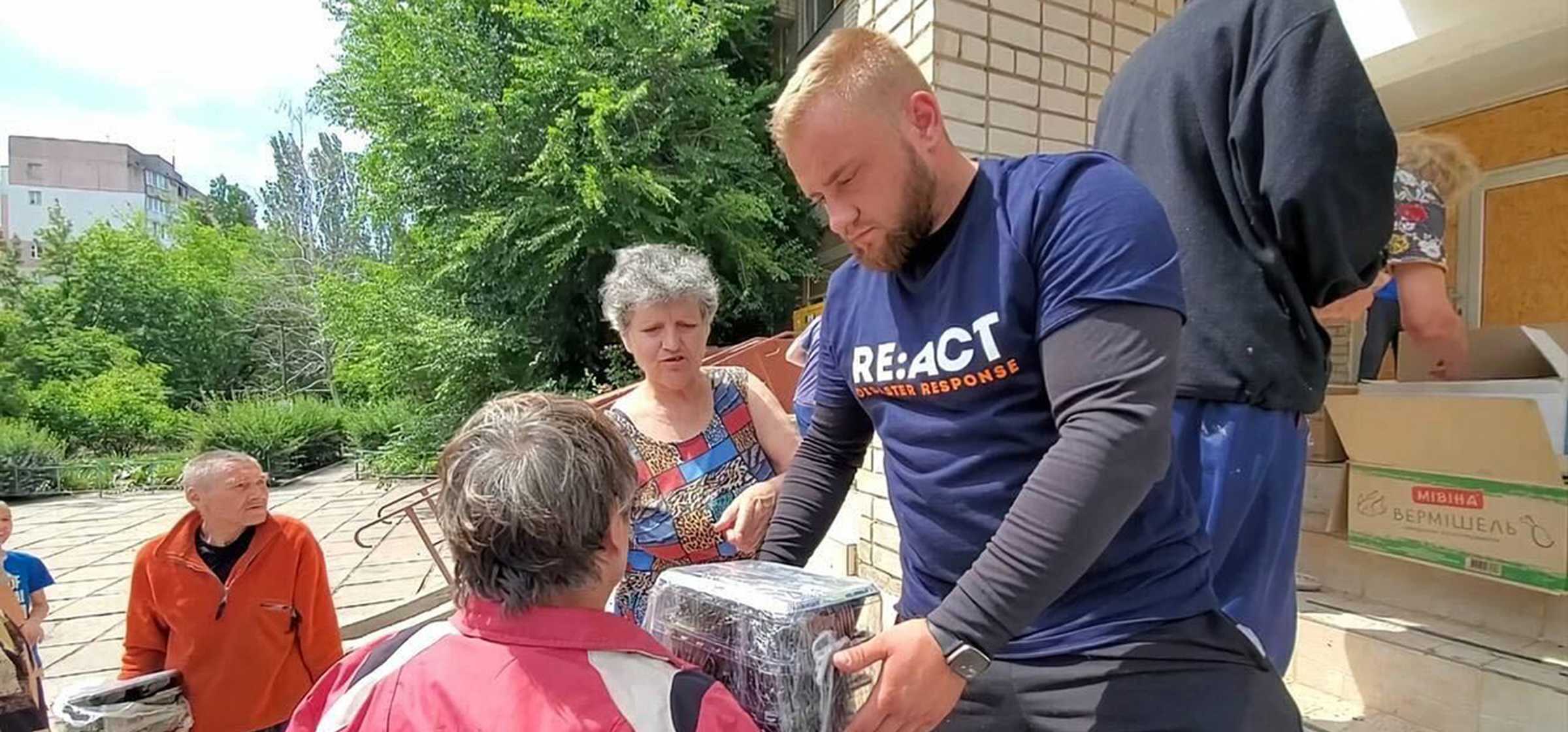REACT and the Ukraine Conflict – the First 500 Days

Posted by Robert Cole 06th July 2023 Stories
Estimated Reading Time: 6 mins
Ukraine is about to reach a significant milestone that it hoped it never would see. It will soon be 500 days since the conflict with Russia began. It’s a war that has left thousands dead, hundreds of thousands injured, and millions displaced.
REACT was one of the first to offer help and since then has been one of the leading disaster response agencies on the ground. Working with local partners, we started by ensuring aid and relief supplies reached those most in need, organising collections and convoys across Europe. Supplies were taken to sorting warehouses in Eastern Poland and from there were delivered right into the heart of Ukraine.
Since then, we have helped organise the provision of essential food packs - each one providing a family of four with enough to eat for a week and the distribution of hot meals in Dnipro and later Kharkiv throughout the frozen Ukrainian winter.
Now, following the destruction of the Kakhovka Dam, over 10,000 desperately needed hot meals have already been served by our local partners to some of the hundreds of thousands of people caught up in the subsequent flooding.
“Since our International Operations Manager, Paul Taylor, and Responder Gordon Mackenzie went on the very first REACT recce to the region just a few days after the Russian invasion, we are proud to reflect on the work we have been able to do, to help some of the most vulnerable in Ukraine.” said our CEO, Toby Wicks.
“This essential and far-reaching support has only been possible through continued work with local and trusted partners such as the Ukraine Education Platform (UEP), GLOBA22 and Myrne Nebo. Together we have been able to punch well above our weight, move rapidly and get help to people in dire need. We are in this for the long term and will stay as long as people still need us.” added Toby.

Named Operation Pace (Pace is the Romanian word for peace) after one of the initial reconnaissance missions to the region surrounding Ukraine, REACT’s work began in earnest in early March 2022.
Responder David Harrington, who is now our strategic liaison lead for Ukraine, led a planning team for a meeting at the Ukrainian embassy in London. Support for the embassy had been requested by the Department for Levelling Up, Housing and Communities and was focused on the handling of the vast amount of material aid that the UK population was donating.
Later that month, a recce and logistics team flew out to Poland to assess what support was required.
They made assessments with the help of Polish partners close to the Ukrainian border and the UEP, an NGO that had swiftly repurposed its mission to help its fellow citizens in any way it could.
David and Paul Taylor crossed the border and headed to Lviv to hold meetings directly with the UEP and to assess their capacity. It’s important to note that REACT was one of only a very few international NGOs who were in Ukraine at this early stage of the war.
The team saw the priorities as water, food, power, and hygiene. Procurement began almost immediately with REACT teams helping get goods into Ukraine via our Polish partners and the UEP. The support also included three vans, all donated by a REACT supporter known to one of our trustees.
By late April another Responder team had deployed to Lviv to support the UEP’s work and further teams were sent to Lublin in Poland, a city close to the Ukraine border. There the Responders helped Ukrainian refugee volunteers to pack aid boxes.
REACT and its local partners began supplying the essential food packs and also helped ensure they reached the most challenging destinations, along and sometimes across the contact line in the east. More than 14,000 boxes were delivered providing 1,176,000 meals.
In response to the freezing Ukrainian winter, our support via the UEP and its partner, GLOBA22, switched to the provision of hot meals for IDPs in Dnipro. David, Paul, and Responder Susannah Pencovich were deployed to the city to carry out due diligence and visit the five social hubs (for women and children, the elderly, and the physically handicapped) where the meals were being provided. More than 37,290 meals were eventually delivered.
In February this year the hot food programme was switched from Dnipro to Ukraine’s second largest city, Kharkiv which is close to the border with Russia. Operated by UEP and a local charity, Myrne Nebo, more than 52,500 hot meals have since been provided to desperate people living in isolated settlements east of the city.
As always with REACT, due diligence was carried out, with David and Paul travelling close to the contact line to accompany members of Myrne Nebo on their rounds.
“It is absolutely essential that we carry out a rigorous evaluation of any third party that we work with. So far, we have had absolutely no issues with our partners in Ukraine. They have been incredible – always performing above and beyond what we could reasonably expect. However, we have a duty to all our supporters and donors to ensure everything is above board before committing ourselves to a partnership on the ground,” explained David.
The shocking destruction of the Kakhovka dam and the subsequent flooding of huge swathes of southern Ukraine around the city of Kherson, made headlines around the world last month. Once again, REACT was one of the first international NGOs to get involved – switching a proportion of our support from Kharkiv to Kherson. That help was in place just 24 hours after the dam collapsed.
Again we partnered with Myrne Nebo to provide hot meals and other essential supplies to those worst affected by the catastrophe. Often the volunteers have to deliver the food via boat. To date over 10,650 hot meals have been distributed.

“In an ideal world we would have money to fund both programmes fully, but unfortunately, we don’t, so we deal with what we have. The work our local partner is doing is fantastic and they make every penny count. What we are doing in Kherson is making a huge difference for the poor people having to live in ghastly conditions and it makes me very proud to be part of REACT,” said Paul Taylor.
One of the people to benefit from the hot meals in Kherson is local resident, Kholodieva Natalya Semenivna.
“A neighbour came and informed me that the Russians had blown up the dam and all the water was coming to us. All I could do was to find my pets, Stepan and Ryzyk, and pull them up one by one with a ladder to the attic. The next day, I began to feel weak and terribly thirsty - there was already a lot of water in the house, so it was very cold and damp - I lost all hope of salvation,” explained Kholodieva.
She added: “I was very surprised by the appearance of young men in a boat, who checked every house to save those who needed it. They rescued not only me, but also my pets, and they gave us clean drinking water and fed me with a hot lunch. It was something I could only dream about in the last few days,”
“They took us to a safe area, gave temporary shelter and fed me with the hot lunches every day. Now I am waiting for my son, who will soon take us to his home in the Vinnytsia region.”
REACT’s Director of Operations, Ben Lampard, says that Kholodieva’s experiences are the reason our staff and Responders do their jobs.
“The people of Ukraine have suffered so much during these last 500 days, and it is an honour to be one of those playing a small part in helping them survive and continue to live as war rages all around them,” said Ben.
He added: “The REACT model of partnering at pace with capable local partners, who have the physical resources and risk appetite to support the most vulnerable and hardest to reach, has proved to be extremely effective, although funding is a growing constraint.”
Toby Wicks agrees that access to financial resources remains a blocker in terms of how much support REACT can give.
“We have a fantastic team of staff and volunteers – second to none. We have the human resources to deploy more widely, but the funds are just not there – yet – to get them to the places where they can do the most good,” said Toby.
REACT relies on the amazing support of our community, who have kept our operations in Ukraine going so far and hopefully will continue to do so.
